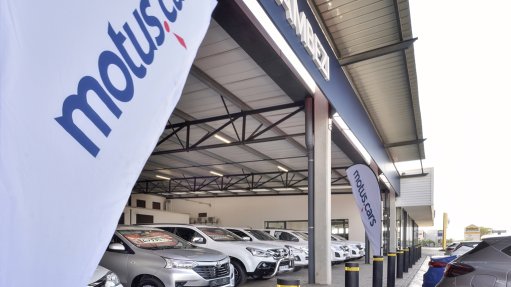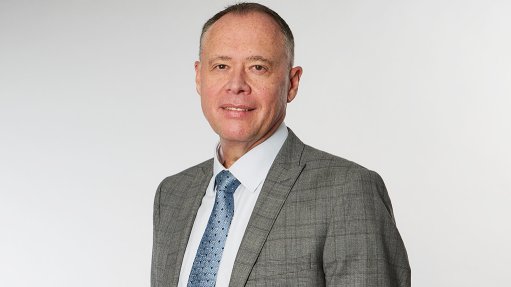Ford seeing progress in southern corridor development, albeit slow – Hill
The automotive industry is “definitely seeing progress” in its discussions with Transnet on developing the southern rail corridor between Gauteng and Gqeberha and Coega, in the Eastern Cape, says Ford Motor Company Africa president Neale Hill.
Discussions on this project started in 2019.
Vehicle manufacturers in Gauteng – BMW, Ford and Nissan – currently move their vehicle exports mainly through Durban.
These manufacturers also have to transport imported components to their plants via Durban, as well as bring in imported vehicles for the local market.
Ford’s logistics via the Durban port are currently divided between rail and road.
The local arm of the US vehicle manufacturer produces the Ranger bakkie for the local and export markets at its Silverton plant in Pretoria.
“We are making progress in our discussions with Transnet,” says Hill. “We’d like there to be more progress, but we are seeing movement, especially now that Transnet has a new management team.
“You are now dealing with people with years of experience, people who have grown up in the organisation.”
Hill notes that there is vulnerability in a system where so many vehicle manufacturers are dependent on a single export route.
“All of us would consider Gqeberha. Look at the recent floods in Durban and snow in KwaZulu-Natal and how that affected exports.
“We, as Ford, must also support a very specific shipping schedule, and these vessels don’t wait if there is a snarl-up on the highway.”
That said, Hill notes that Transnet has moved to improve the rail service between Gauteng and Durban.
“We are seeing greater capacity coming in on the Durban line for automotive. The line is being upgraded and we are seeing more trains coming through – but, again, we would definitely like to see more happen.
“With our production schedule, we would ideally like to see more vehicles on rail, as opposed to vehicles going on the roads.”
Hill says Ford has no preference as to whether the southern corridor is operated by Transnet, a private-public partnership, or a third-party operator.
“We are not prescriptive as to what the ultimate solution should look like, but we would like something that is effective, efficient and reliable.
“And, as I said, our engagement with Transnet has been phenomenal. We do see some green shoots.”
Ford produces between 650 and 680 Rangers a day, of which around 65% is exported, says Hill.
“You are looking at exporting 400 vehicles a day, so we want four trains a day –and that’s just us, not Volkswagen, BMW or Nissan.
“We also import components for the Silverton plant.
“As an industry, we believe there is enough opportunity to fill the railway line both ways.”
The Volkswagen, Isuzu and Mercedes-Benz plants are located in the Eastern Cape and also need to transport their vehicles – made locally and imported – to customers in the north of the country.
Hill says he hopes to see material movement on the development of the southern corridor in the next 18 to 24 months.
Naamsa | The Automotive Business Council and Transnet last month signed a memorandum of understanding (MoU) to convene a naamsa–Transnet ‘auto war room’.
This war room will drive the collection, consolidation and sharing of data to support the implementation of strategic initiatives, while it will also monitor key railway performance indicators, slot availability/capacity, and rolling stock availability and utilisation.
The MoU also supports the development of priority infrastructure projects by the State railway owner, including the southern corridor.
Article Enquiry
Email Article
Save Article
Feedback
To advertise email advertising@creamermedia.co.za or click here
Press Office
Announcements
What's On
Subscribe to improve your user experience...
Option 1 (equivalent of R125 a month):
Receive a weekly copy of Creamer Media's Engineering News & Mining Weekly magazine
(print copy for those in South Africa and e-magazine for those outside of South Africa)
Receive daily email newsletters
Access to full search results
Access archive of magazine back copies
Access to Projects in Progress
Access to ONE Research Report of your choice in PDF format
Option 2 (equivalent of R375 a month):
All benefits from Option 1
PLUS
Access to Creamer Media's Research Channel Africa for ALL Research Reports, in PDF format, on various industrial and mining sectors
including Electricity; Water; Energy Transition; Hydrogen; Roads, Rail and Ports; Coal; Gold; Platinum; Battery Metals; etc.
Already a subscriber?
Forgotten your password?
Receive weekly copy of Creamer Media's Engineering News & Mining Weekly magazine (print copy for those in South Africa and e-magazine for those outside of South Africa)
➕
Recieve daily email newsletters
➕
Access to full search results
➕
Access archive of magazine back copies
➕
Access to Projects in Progress
➕
Access to ONE Research Report of your choice in PDF format
RESEARCH CHANNEL AFRICA
R4500 (equivalent of R375 a month)
SUBSCRIBEAll benefits from Option 1
➕
Access to Creamer Media's Research Channel Africa for ALL Research Reports on various industrial and mining sectors, in PDF format, including on:
Electricity
➕
Water
➕
Energy Transition
➕
Hydrogen
➕
Roads, Rail and Ports
➕
Coal
➕
Gold
➕
Platinum
➕
Battery Metals
➕
etc.
Receive all benefits from Option 1 or Option 2 delivered to numerous people at your company
➕
Multiple User names and Passwords for simultaneous log-ins
➕
Intranet integration access to all in your organisation

















